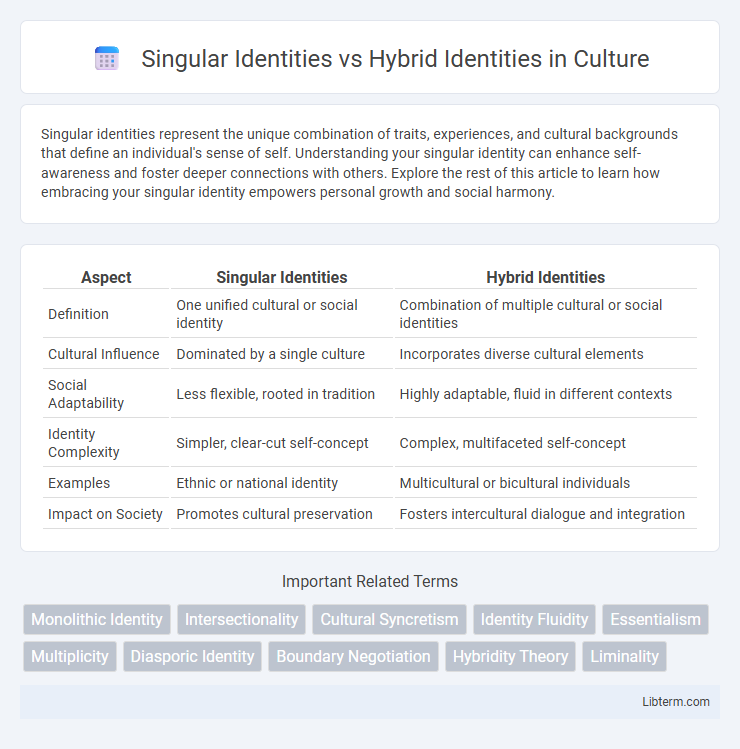Singular identities represent the unique combination of traits, experiences, and cultural backgrounds that define an individual's sense of self. Understanding your singular identity can enhance self-awareness and foster deeper connections with others. Explore the rest of this article to learn how embracing your singular identity empowers personal growth and social harmony.
Table of Comparison
| Aspect | Singular Identities | Hybrid Identities |
|---|---|---|
| Definition | One unified cultural or social identity | Combination of multiple cultural or social identities |
| Cultural Influence | Dominated by a single culture | Incorporates diverse cultural elements |
| Social Adaptability | Less flexible, rooted in tradition | Highly adaptable, fluid in different contexts |
| Identity Complexity | Simpler, clear-cut self-concept | Complex, multifaceted self-concept |
| Examples | Ethnic or national identity | Multicultural or bicultural individuals |
| Impact on Society | Promotes cultural preservation | Fosters intercultural dialogue and integration |
Understanding Singular Identities
Singular identities pertain to individuals defining themselves by one dominant social, cultural, or personal characteristic, such as ethnicity, nationality, or gender, which shapes their worldview and interactions. This focused identification simplifies self-perception and group belonging but may limit exposure to diverse perspectives inherent in hybrid identities. Understanding singular identities involves recognizing the depth of connection and meaning derived from a primary identity that heavily influences behavior, values, and social relationships.
Exploring Hybrid Identities
Hybrid identities emerge from the fusion of multiple cultural, social, or ethnic backgrounds, creating a dynamic and fluid sense of self that transcends traditional singular identities. These identities reflect the complexities of globalization, migration, and digital connectivity, allowing individuals to navigate and blend various cultural narratives simultaneously. Research on hybrid identities highlights their role in fostering inclusivity, adaptability, and multicultural understanding in increasingly diverse societies.
Historical Context of Identity Formation
Singular identities emerged historically through rigid social structures and colonization, enforcing fixed categories like race, nationality, or religion to maintain power hierarchies. Hybrid identities evolved from migration, globalization, and cultural exchanges, reflecting fluid and intersectional self-definitions shaped by multiple influences over time. The historical context reveals how identity formation shifted from exclusionary classifications to more dynamic, inclusive understandings of identity in diverse societies.
Factors Influencing Identity Choices
Identity choices are influenced by factors such as cultural background, social environment, and personal experiences, shaping whether individuals embrace singular or hybrid identities. Sociopolitical context and exposure to diverse groups also play critical roles in determining identity formation. Psychological needs for belonging and self-expression further guide the adoption of exclusive or multifaceted identity constructs.
Cultural Impacts on Singular and Hybrid Identities
Cultural impacts on singular identities often result in a strong alignment with specific traditions, languages, and social norms, reinforcing a clear sense of belonging and community cohesion. In contrast, hybrid identities emerge from the blending of multiple cultural influences, creating dynamic, multifaceted identities that challenge conventional boundaries and promote intercultural exchange. These hybrid identities foster adaptability and innovation but may also face identity conflicts and social negotiation as individuals navigate diverse cultural landscapes.
Challenges Faced by Hybrid Identity Individuals
Hybrid identity individuals encounter challenges such as cultural dissonance, where balancing multiple cultural norms leads to internal conflicts and social exclusion. They often face identity fragmentation, making it difficult to fully belong to any single community or establish a coherent self-concept. Navigating systemic biases and stereotypes further complicates their social integration and access to opportunities.
Benefits of Embracing Multiple Identities
Embracing hybrid identities allows individuals to integrate diverse cultural, social, and personal dimensions, fostering greater adaptability and creativity. This multiplicity enhances emotional intelligence and broadens perspectives, facilitating stronger interpersonal connections across varied groups. Hybrid identities promote resilience by enabling people to navigate complex environments with a flexible sense of self.
Identity Negotiation in a Globalized World
Identity negotiation in a globalized world increasingly involves balancing singular identities, which emphasize a fixed cultural or national affiliation, against hybrid identities that blend multiple cultural influences, creating fluid and dynamic self-conceptions. The negotiation process requires individuals to constantly adapt and reconcile conflicting norms, values, and expectations from diverse social contexts to maintain coherence and social belonging. This dynamic interplay between singular and hybrid identities facilitates cross-cultural communication and fosters inclusive environments in multicultural societies and global networks.
Representation of Identities in Media
Singular identities in media often reinforce monolithic portrayals that limit diverse narratives to fixed, homogeneous categories, while hybrid identities challenge these by showcasing fluid, intersectional experiences reflecting multicultural realities. Representation of hybrid identities promotes inclusivity by highlighting the complexities of overlapping cultural, racial, or social affiliations, countering stereotypes and enriching audience understanding. Media that embraces hybrid identities fosters nuanced storytelling, thereby advancing authentic visibility and empowering marginalized communities.
Future Trends in Identity Evolution
Future trends in identity evolution emphasize the rise of hybrid identities, blending physical, digital, and decentralized elements to create more dynamic and fluid self-representations. Singular identities, traditionally fixed and location-based, face challenges as cross-platform authentication and blockchain-based identity verification become mainstream. Advances in AI-driven identity management and biometrics will further blur boundaries, enabling seamless integration across virtual and real-world environments.
Singular Identities Infographic

 libterm.com
libterm.com